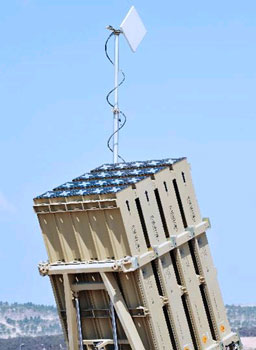Israel deploys first anti-rocket defense battery in south
The Israel Defense Forces on Sunday deployed for the first time the Iron Dome anti- rocket system amid a sharp escalation of violence along the Gaza border in recent weeks.
The system's first battery was positioned on the northern outskirts of Beer Sheva, a desert city hit by three Grad-type rockets fired by Gaza militants last week. A second battery is slated to be deployed later this week near the coastal city of Ashkelon.
Defense Minister Ehud Barak on Friday ordered the deployment of Iron Dome in the face of growing public pressure, saying the decision was approved "as a preliminary trial."

Israeli anti-rocket system Iron Dome is deployed in Beersheba, southern Israel, on March 27, 2011. Israel on Sunday started deploying two batteries of the Iron Dome anti-rocket system in the southern country, in a bid to foil longer-range Kassam and Grad rockets from putting over a million Israelis within striking range in major urban areas. (Xinhua/Rafael Ben-Ari)
Development of Iron Dome, which tracks and blows up projectiles in mid-air, began in the aftermath of the 2006 Lebanon war, during which an estimated 4,000 Katyusha rockets and mortars showered northern Israel.
The system, which intercepts rockets at ranges of 5 to 70 km, was developed in record-time: about three years from the drawing board to Sunday's deployment. A battery includes three launchers with 20 missiles each.
In November last year, it succeeded in destroying a salvo of three Grad and two Qassam rockets in one of numerous field trials.
While the system is expected to perform brilliantly in countering rockets in real-time, defense officials were careful to stress that it is still in an experimental stage, and requires further fine tuning before becoming fully operational in the coming months.
"This system is unique. There is no other like it in the world, and we are working hard to bring it to peak performance," Brig.- Gen. Doron Gavish, who heads the Air Defense Division, told reporters.
"It is also important to emphasize that we are still in the evaluation phase," Gavish said, adding that the deployment was accelerated in light of the recent dramatic increase in rocket attacks.
He said the Air Force plans to deploy the mobile system in several locations around the south in the coming weeks, in accordance with changing operational needs.
Prime Minister Benjamin Netanyahu was also careful to stress that the system will not afford residents of the south full protection against projectiles fired from Gaza.
"I do not want to foster the illusion that Iron Dome will provide a complete or comprehensive answer," Netanyahu said at the cabinet's weekly meeting on Sunday.
"The true answer to the missile threat is a combination of aggressive and deterrent measures, protective measures and a strong stand by the government and the public," Netanyahu said.
Netanyahu and Barak were lambasted in recent weeks for failing to order the deployment of Iron Dome due to financial considerations. The cost of each "Tamir" missile, designed to knock down rockets manufactured in Gaza cellars, is estimated at tens of thousands of dollars.
"I don't want to discuss costs. Our only consideration is the cost in terms of human life," said Gavish, adding that the system' s other advantage is in giving Israeli politicians "more time to make decisions without the pressure of casualties."
He declined to comment on whether the battery deployed Sunday would also be able to protect other southern cities targeted by rockets without having to be moved from its present location.
But the Air Force has said on several occasions that the two batteries currently at its disposal will not be sufficient to provide protection to the entire south, or in case Israel would have to wage war on more than a single front.
The U.S. Congress has thus far declined to approve 205 million dollars requested by Israel for the procurement of additional batteries. Gavish, however, said more will be added in the coming years.
On Sunday, as soldiers began setting up the first battery, hostilities along the nearby Gaza border continued. Earlier, IAF jets struck and killed two Palestinians, said to be members of an Islamic Jihad rocket crew, and wounded three others near the Jabaliya refugee camp.
Xinhua

